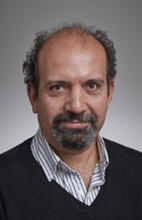Organic & Quantum-dot Light Emitting Devices: Current Challenges & Research Opportunities

Speaker:
Professor
Hany
Aziz,
Department
of
Electrical
and
Computer
Engineering
ABSTRACT:
Organic
Light
Emitting
Devices
(OLEDs)
are
now
used
in
commercial
products,
and
Quantum-dot
LEDs
(QLEDs)
are
expected
to
follow
suit
in
the
next
3-5
years.
As
the
technology
of
organic
and
hybrid
semiconductors
moves
from
the
lab
to
the
marketplace,
certain
fundamental
limitations
and
technological
challenges
related
to
their
performance,
reliability
and
manufacturing
become
increasingly
more
important
and
create
new
opportunities
for
research.
In
this
seminar
a
brief
introduction
to
OLEDs
and
QLEDs
will
be
provided,
and
some
of
the
current
challenges
and
new
research
opportunities
will
be
highlighted.
Some
of
our
research
activities
in
both
areas
will
also
be
briefly
presented.
BIOGRAPHY:
Hany Aziz is a Professor and University Research Chair in the Department of Electrical & Computer Engineering at the University of Waterloo and the Waterloo Institute for Nanotechnology (WIN). He conducts research in the area of organic and hybrid (organic/ inorganic) electronic and optoelectronic materials and devices, with a focus on material and device physics. His research spans a wide range of interests from studying molecular level electronic, excitonic and material aging processes and device failure mechanisms, to developing novel devices and fabrication technologies for next generation electronics. He has published more than 180 papers in this area and was awarded 57 US patents. He obtained his PhD in materials science and engineering from McMaster University, Canada in 1999. Prior to joining the University of Waterloo in 2007 he was a research scientist at Xerox Research Centre of Canada.